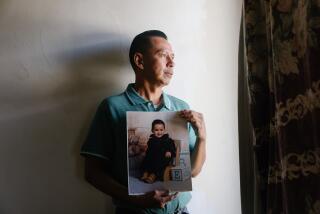Broderick Tape Reveals Emotional Call to Son : Murder trial: In a conversation abounding in obscenities, she is heard telling her son, then 7, that she was going to have police come and ‘beat up Daddy.’
- Share via
The prosecutor in the second murder trial of Elisabeth Anne (Betty) Broderick played an emotional tape Wednesday in which Broderick makes threatening comments about her ex-husband to their youngest son on the day before Thanksgiving in 1986.
The tape closed out Wednesday’s session, and testimony is scheduled to resume Monday. In the tape, she tells Rhett, then 7, that she wishes she could be with him Thanksgiving Day and blames not being able to see him on his father, Daniel T. Broderick III.
Broderick, 44, is accused of murdering Daniel Broderick, 44, and his second wife, Linda Kolkena Broderick, 28, in the bedroom of their Marston Hills home on the morning of Nov. 5, 1989. Last year’s trial ended in a hung jury.
The tape, recorded on an answering machine in Daniel Broderick’s home, is one of many that Deputy Dist. Atty. Kerry Wells has played to illustrate threats made by Broderick against her ex-husband and his new wife. The tape played Wednesday was not introduced in last year’s trial.
The tapes are filled with obscenities, with Broderick using one word repeatedly to describe Daniel Broderick and another to describe his new wife.
In the tape played Wednesday, Broderick says she intends to bring the police to Daniel Broderick’s home and have them “beat up Daddy.” At the time, Daniel Broderick had custody of the couple’s four children, and she was without formal visitation rights.
After Daniel Broderick left the marriage in 1985 and the divorce was made final a year later, Elisabeth Broderick had often gone without seeing her children on important holidays. In the tape, she tells her son that living with his father is not in his best interests.
“Maybe you’re not dead physically,” she said, “but you’re dead emotionally. You’re father is a cold-hearted bastard who’s (expletive) the office (expletive).”
She tells him his father is a “sexual maniac” and that “I’ll get the police to beat the (expletive) out of him. I’ll bring the TV cameras with me.”
Before hanging up on Rhett--the conversation ends with him saying, “Mom, mom, mom . . . “--she tells him that he’s a “hostage” and a “prisoner of war,” not unlike political prisoners in Lebanon.
She says of Rhett’s Thanksgiving with his father: “You don’t belong there, with the (expletive), the (expletive for Linda Broderick) and his drunken, (expletive) friends.”
Her last comment is: “He’s killing you all. He’s ruining your lives and killing you. What kind of a parent is that? A very bad one. You should tell him to (expletive) and come over here. . . . Go fight, go beat up Daddy.”
The prosecution, now in the rebuttal phase of testimony, apparently played the tape in response to comments made by Broderick in cross-examination, in which she denied telling Rhett to “go beat up Daddy.”
The prosecution still has the right to call, as some of its closing witnesses, both of Broderick’s sons, Rhett, now 12, and his older brother, Danny, 15.
Dr. Park Elliott Dietz, a prominent psychiatrist who has testified as an expert witness in cases involving would-be presidential assassin John Hinckley and an obsessive fan who stalked and murdered an actress, spent most of the day on the stand, being cross-examined by defense attorney Jack Earley.
Dietz said that he is being paid $300 an hour for his testimony, and, in often-tedious cross-examination, he appeared unwilling to concede even minor points.
He said Broderick suffers from dual-personality disorders, narcissistic and histrionic; that she “lacks the warmth of understanding how other people feel--she lacks empathy,” and that she feels a sense of entitlement in her ultimate quest--”revenge against Dan and Linda.”
Dietz said that Broderick was also manipulative with her children, that she pitted them against their father. He said such tactics are not uncommon among warring couples, “but not to this extent.”
Dietz quoted liberally from a notebook written by Elisabeth Broderick in 1976 during a marriage encounter counseling weekend and from nine volumes of diaries she compiled after she and her husband separated.
Earley has tried to introduce both Broderick’s notebook and the diaries as a whole, but so far, Superior Court Judge Thomas J. Whelan has refused to allow the jury to see the documents in their entirety.
More to Read
Sign up for Essential California
The most important California stories and recommendations in your inbox every morning.
You may occasionally receive promotional content from the Los Angeles Times.













